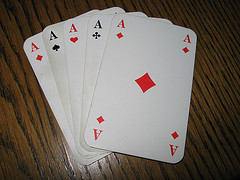 First, here are my PowerPoint slides from today’s class as a PDF. (I kept the black background this time, so you may use a lot of ink if you print them.) You’ll find all the clicker questions today–the ones on frequency analysis graphs and on academic integrity–as well as the two slides I included on the Argenti family’s work as papal cipher secretaries.
First, here are my PowerPoint slides from today’s class as a PDF. (I kept the black background this time, so you may use a lot of ink if you print them.) You’ll find all the clicker questions today–the ones on frequency analysis graphs and on academic integrity–as well as the two slides I included on the Argenti family’s work as papal cipher secretaries.
I shared a few of the “ethical or not?” clicker questions on Twitter and invited folks there to respond with their opinions. Here are some of the results:
- “The student next to you drops his test and you accidentally see the answers. This leads you to change one of your answers.” You all said this was unethical (69 to 31). My “tweeps” agreed, 3-to-1.
- “Suppose that one of your spring semester professors assigns a 5-page paper on a topic identical to one assigned by one of your fall semester professors. You received an A- on the fall paper, so you turn the same paper in to your spring professor.” You all were split (53% ethical, 47% unethical). My tweeps were not; they said it was unethical 4-to-1.
- “You find a copy of the instructor’s solutions manual to one of your textbooks online. You use it to check your homework before turning your homework in.” You all said unethical by a big margin (87% to 13%). My tweeps were split; one said ethical, one said unethical, one said it was a gray area.
Regarding that second scenario (reusing a fall paper in a spring course), I pointed out the section in the Vanderbilt Honor Code that explicitly forbids this without prior authorization from both instructors. However, we didn’t talk about why this would be considered a violation of academic integrity. My Twitter friends had some useful things to say about this…
- @jbj said: In a university setting, the idea is that you get your credits for doing work. You’re essentially stealing credits.
- @jbj continued: & so (for your student), it’s not necessarily unethical in some abstract, contemplative sense, but mostly in that univ. context.
- @derekbruff (that’s me) replied: Which is one of the points I was making today: There are sometimes complex relationships btw individual and group ethics.
- @TSindelar said: I’ve run into this issue a lot with students, the school’s academic honesty policy specifically addresses it but Ss dont get why
- @TSindelar continued: likely it connects to underlying issues about why students are in school and what credit means…
- @derekbruff (me again) said: The “self-plagiarism” issue does seem to imply that course credit = amount of work completed. Which is better than = time w/butt in seat.
- @derekbruff continued: But it’s a long way away from course credit = evidence of mastery of particular learning goals. Which would permit evidence to be reused.
- @idbeatty said: Q2 is unethical ‘cuz the point was for the student to LEARN something by engaging in the PROCESS (now bypassed).
- @idbeatty continued: How about course credit = evidence of differential increase in student’s knowledge/skills? => Reused evidence doesn’t show gain.
My take on the question is pretty much the same as @jbj’s take in the first couple of tweets above. Take this to the extreme: What if you could use the same paper for every single course you took at Vanderbilt? Should you get credit for all those courses? If so, might people dramatically misinterpret your transcript?
Receiving credit for two courses is likely to be interpreted as you having learned (roughly) twice as much as you would have learned just taking a single course. But if you didn’t learn nearly as much in the second course (because you recycled work from the first course), that interpretation would be wrong.
Questions or further comments about this topic?
Image: “Victory!” by Flickr user Xjs-Khaos, Creative Commons licensed.

2 Pingbacks